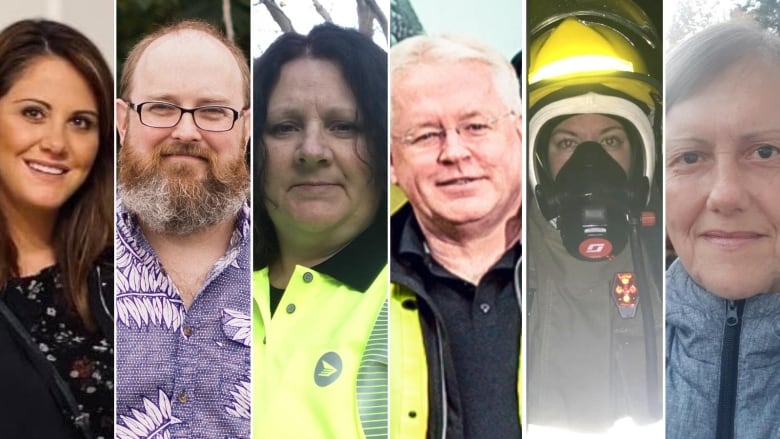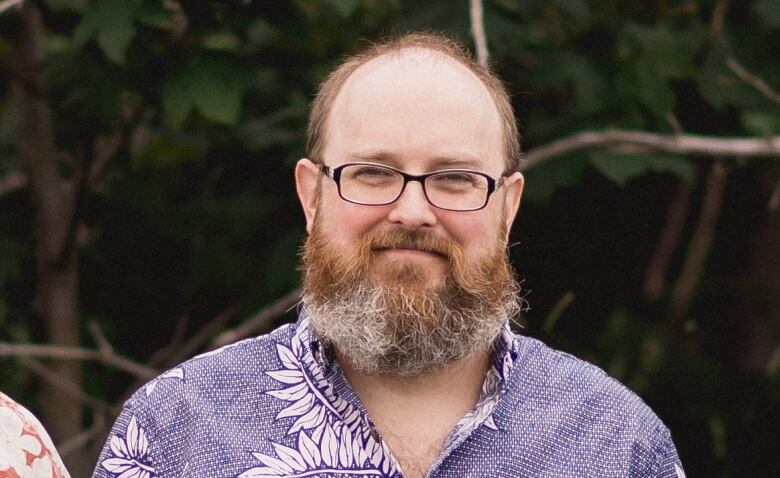Early in the pandemic, front-line workers were hailed as heroes. Do they still feel that way?
Some essential workers say moments of appreciation help them to stay motivated

Since the beginning of the pandemic, front-line and essential workers have provided help where it is needed most.
They take care of individuals in long-term care homes, stock grocery shelves and treat patients with COVID-19. They dedicate their lives to keeping Canadians healthy and safe.
But do front-line workers feel like heroes?
CBC News spoke with six essential workers about how they keep going in their jobs nearly two years into the pandemic.
Jessica Ryan, firefighter

For Jessica Ryan, one of the most challenging parts about being a firefighter during the pandemic is staying mentally strong.
After responding to a call, Ryan says, firefighters typically gather in the fire hall to discuss what went well and what could be improved. These debriefs, which Ryan says are important in addressing firefighters' mental health, have to be held virtually due to the pandemic.
"We couldn't hang out and take care of each other and it was really hitting your mental health," said Ryan, who works as a firefighter in Come By Chance, N.L.
"I guess nobody feels like a hero in that aspect."
Ryan, whose husband is also a firefighter, says it's sometimes difficult to balance working and taking care of their 2-year-old son, Liam.
But "life still went on and someone had to attend to the calls we were getting," she said. "We're in the town to help people."
Arleen Critch, letter carrier

In her 22 years as a letter carrier with Canada Post, Arleen Critch says she didn't truly realize how crucial her job was until the pandemic.
"For the people who were basically shut in [their houses], sometimes we were their only contact — for weeks, sometimes even for months," said Critch.
Critch says she went from delivering an average of 40 parcels a day to around 100 to 120 parcels when the pandemic hit, an increase that was emotionally and physically draining for some employees.
Although she doesn't call herself a hero, it brings her joy to know she's providing people with essential goods.
"People are still thanking you and posting thank-you notes on their doors or their mailboxes," she said.
"You don't really stop to think that it's such a big deal until we're in this type of situation."
David Coughlan, grocery store employee and custodian

When people rushed to grocery stores during lockdown to buy toilet paper and hand sanitizer, David Coughlan was working overnight to keep grocery shelves stocked.
"I felt like I was doing my job and keeping other families like myself safe," said Coughlan, who worked as a night stocker at a Walmart in St. John's for five years.
The father from Torbay, N.L., has arthritis. He left his job at Walmart due to its physical demands and began working as a custodian with the Newfoundland and Labrador English School District in July 2020.
Coughlan, who hasn't taken any vacation time during the pandemic, stays motivated by remembering that his job is essential to keeping children safe.

"I got kids, and I know darn well that you have to sanitize on a good day," said Coughlan. "So with COVID, it made it even more important."
When Coughlan isn't working as a custodian, he provides another essential service to children: working as Santa Claus in Portugal Cove-St. Philip's.
"To know that Santa is still coming is important for the kids," he said.
April Butt, registered nurse

April Butt says nurses have always been heroic.
"I signed up for this profession to give back to people," said Butt, who works as an emergency room nurse at St. Clare's Mercy Hospital in St. John's.
"I've never sat down and thought, 'Wow, you're a hero for going to work today.' I think nurses are heroes long before the pandemic."
Butt says many people previously showed their appreciation for front-line workers by honking their car horns or beating pots and pans in the street. Although nurses are still treating a high volume of patients in the emergency room, Butt says the outward appreciation isn't as palpable.
"I'm not really sure how I get up and go in the morning," she said.
"People are kind of done with the whole situation."
Beverly King, fish plant worker

While Canadians are encouraged to stay six feet apart from others, Beverly King, who works at a fish plant on Newfoundland's east coast, says she is often unable to stay distanced from her colleagues.
"We're not even two feet away from another person," said King, who's been a fish plant worker for about 12 years.
"You're just scared to death."
King, whose husband has asthma, says masking and sanitizing doesn't alleviate her anxiety about potentially catching COVID-19. With what she feels is a lack of support for fish plant workers' well-being, she says it's difficult for her to feel like a front-line hero.
"[There] should have been more discussion on what needed to be done to put us back to work and make us feel more secure. It was scary all around, especially the first year."
Charlie Hamlyn, director of public works in Portugal Cove-St. Philip's

Charlie Hamlyn has administered essential services like garbage pickups and street cleaning for just over three years as the director of public works in Portugal Cove-St. Philip's.
He says some people previously contacted public works to inquire about garbage pickup, for example, in a frustrated or urgent tone. That's changed since the pandemic began, he said.
"There's more of a tone of appreciation and 'thank you,'" said Hamlyn.
"I work very long days. [When] you get the calls where people need you, you feel valued within this position."
Hamlyn says he finds strength as a front-line worker by talking to his team, and by knowing that he is doing everything he can to make his co-workers and community feel safe.
"It fills your heart when you know that people are under so much stress and anxiety, and you're just trying to be there for everyone that you can help out."

